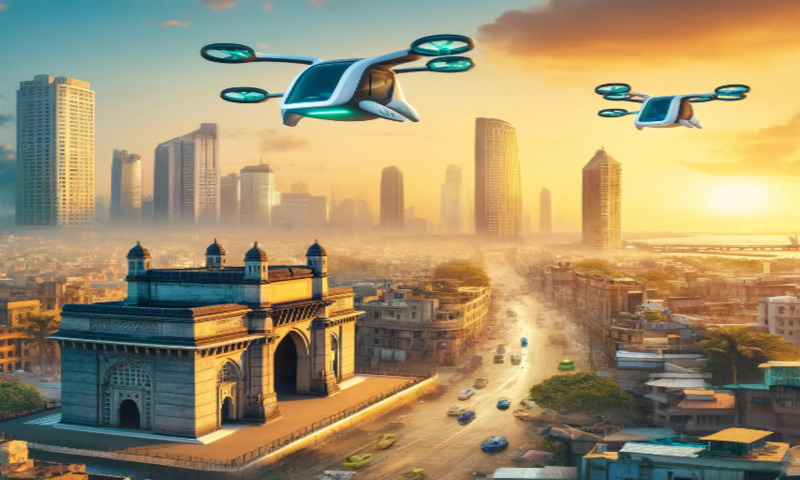Soaring Into The Future: Electric Air Taxis In India

In a groundbreaking collaboration, InterGlobe Enterprises, the parent company of IndiGo, has partnered with Archer Aviation to introduce all-electric air taxis in India, promising a significant shift in urban transportation. The partnership, formed in November 2023, aims to provide a swift and sustainable solution for navigating congested cities, potentially reshaping the future of mobility in the country. How will this impact the present mobility industry and what awaits ahead? Let’s uncover the answers to these questions below
The eVTOL Fleet: The new ‘Kaali Peeli’
Archer Aviation’s eVTOL aircraft, named “Midnight,” is at the core of this innovative venture. These five-seater electric planes operate similar to helicopters but with reduced noise levels and enhanced safety features. With six battery packs, the Midnight eVTOLs can accommodate four passengers and a pilot, offering an impressive range of approximately 100 miles and speeds of up to 240 km/h.
Start Investing with Free Expert Advice!
Rapid Charging and Integration
The electric air taxis boast rapid charging capabilities, with a full charge taking only 30-40 minutes. This efficiency minimizes downtime, enabling seamless integration into existing transportation networks. The initial focus will be on launching services in Delhi, Mumbai, and Bengaluru, with the first route connecting Connaught Place in Delhi to Gurugram in just 7 minutes, a journey that typically takes 90 minutes by car.
Impact on the Auto Industry: Disruption ahead?
The introduction of electric air taxis could disrupt the traditional automotive industry in several ways. Firstly, there could be a shift in consumer preference towards electric vehicles (EVs) for shorter urban journeys, impacting the demand for traditional cars. Secondly, the reduced travel time and competitive pricing of air taxis may lead to a decline in car ownership, particularly in urban areas. Not only this, but electric taxis can also become a convenient way for travellers to switch from railways to airways. The multifold growth of the aviation industry has screwed a little dent on the railway industries. For instance – A 2nd AC ticket on the Patna Suvidha Express would cost a passenger around ₹7000, akin to a flight ticket. In train, the journey would take over 26 hours, whereas a flight from Mumbai to Patna takes a mere two-and-a-half hours. This will further lead to intense competition and wider benefits for passengers.
What if?
In a hypothetical scenario where electric air taxis are introduced as a new transportation option in a city, there could be significant impacts on the auto industry. Assuming a 10% reduction in car ownership among urban residents who now have access to air taxi services, and a 5% increase in the adoption of electric vehicles (EVs) due to the growing interest in electric mobility, the market dynamics could shift noticeably. This could lead to a decrease in car sales as fewer people feel the need to own a car for short trips within the city. However, there could be an increase in the sales of EVs as more people recognize the benefits of electric vehicles, potentially benefiting companies involved in EV production and infrastructure development, such as charging stations. Additionally, the introduction of air taxis could change how people choose to travel, with more individuals opting for air taxis and public transportation over driving their own cars.
Financial Market Implications
The introduction of electric air taxis could have a profound impact on the financial market, particularly in the automotive sector. As these air taxis offer a new and efficient mode of urban transportation, investors may begin to reallocate their investments from traditional automakers to companies involved in electric aviation and infrastructure development. This shift in investment focus could lead to changes in stock prices and market valuations, reflecting the changing dynamics of the transportation industry. Traditional automakers may experience downward pressure on their stock prices as investors perceive a decrease in demand for traditional cars. Meanwhile, companies involved in electric aviation and infrastructure development may see an increase in stock prices as investors anticipate growth and innovation in these sectors. Overall, the introduction of electric air taxis could stimulate a shift in investment trends and stock market dynamics, highlighting the evolving nature of urban mobility and the financial market.
Looking Ahead: A Sustainable Future
As Archer Aviation progresses towards obtaining regulatory approvals and scaling up manufacturing, the dream of sustainable urban mobility in India draws closer. The collaboration between InterGlobe Enterprises and Archer Aviation exemplifies the power of innovation and collaboration in shaping a more sustainable future. As these electric air taxis take to the skies, they not only promise to revolutionize urban transport but also leave a lasting impact on the automotive industry and financial markets.
Trending Blogs: Invest in Small Cap & Mid Cap Mutual Fund & Stocks | US FED’s rate cut announcements | Companies affected by Rise in Crude Oil Price | Fall in IT Stocks | Launch of 4 New Indices | Revised Lot Sie of Nifty Contracts | RBI Monetary Policy Committee Meet 2024 | ITC Share Surge After BATs Block Deal | Impact of RBI Circular on Currency Trading
Related Articles: How to Open a Demat Account Without a Broker | Factors to Keep in Mind While Opening a Demat account | Factors to Consider When Opening a Demat Account
Popular Stocks: ICICI Bank Share Price | HDFC Bank Share Price | CDSL Share Price | UPL Share Price | TCS Share Price | BHEL Share Price | Trident Share Price | IRFC Share Price | Adani Power Share Price




